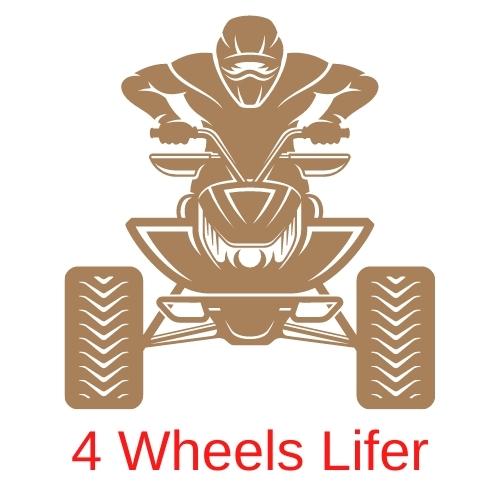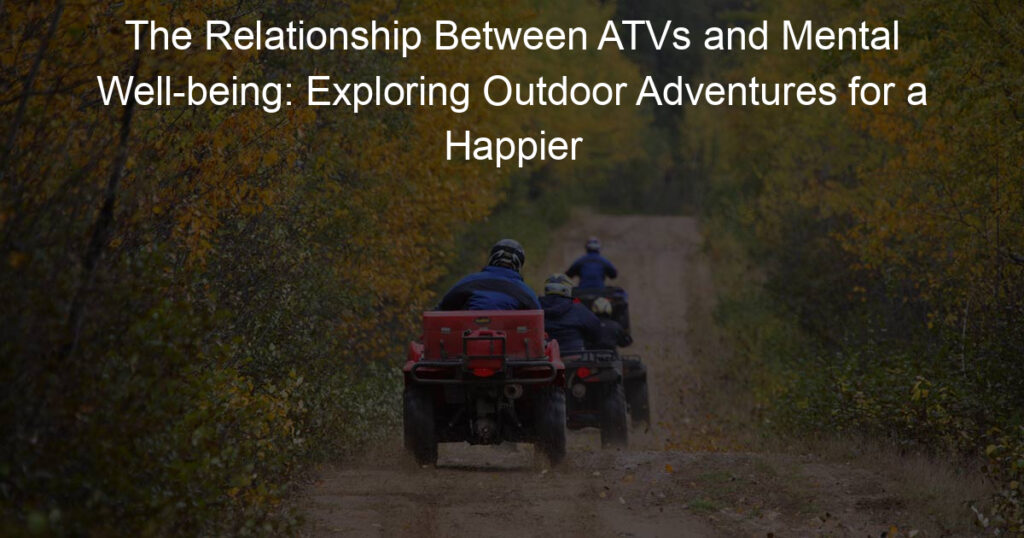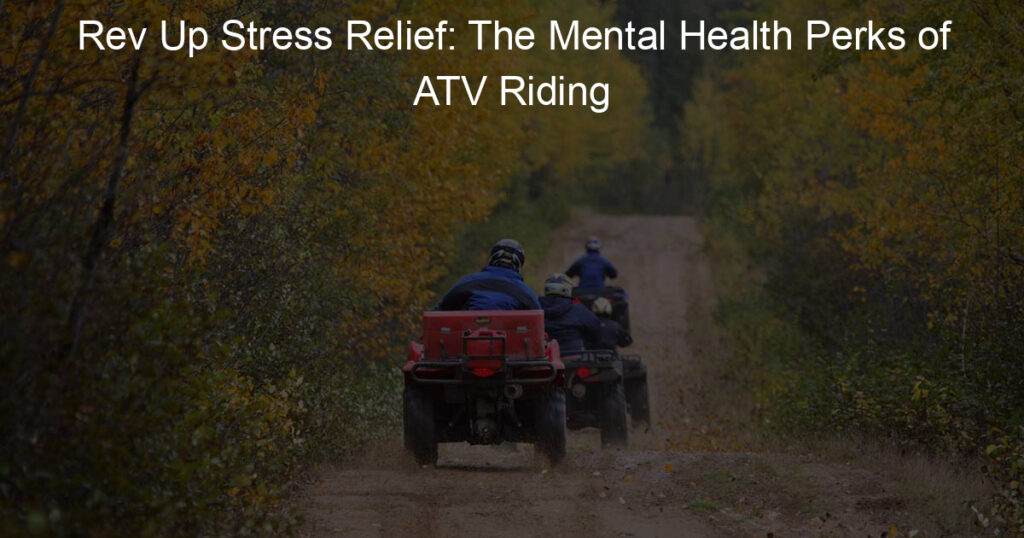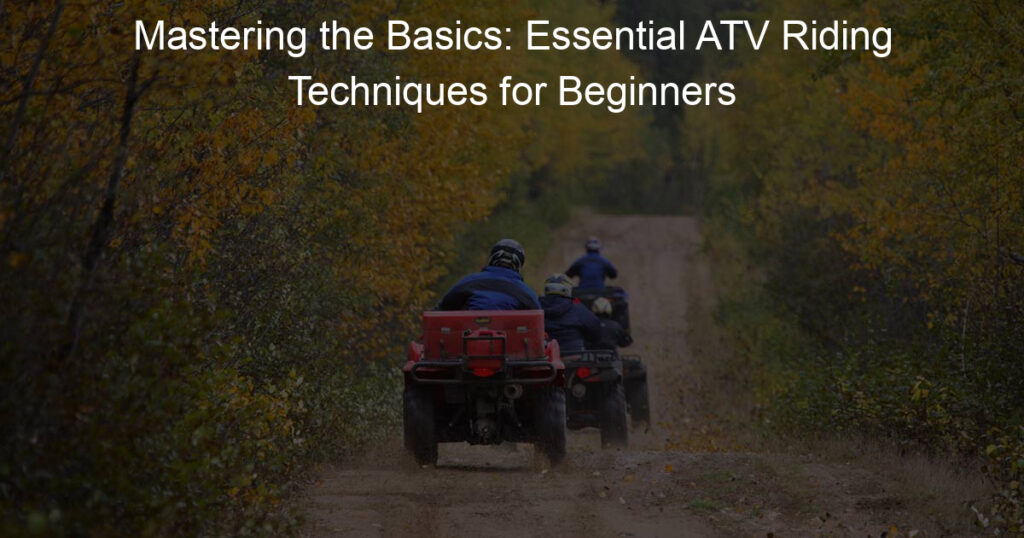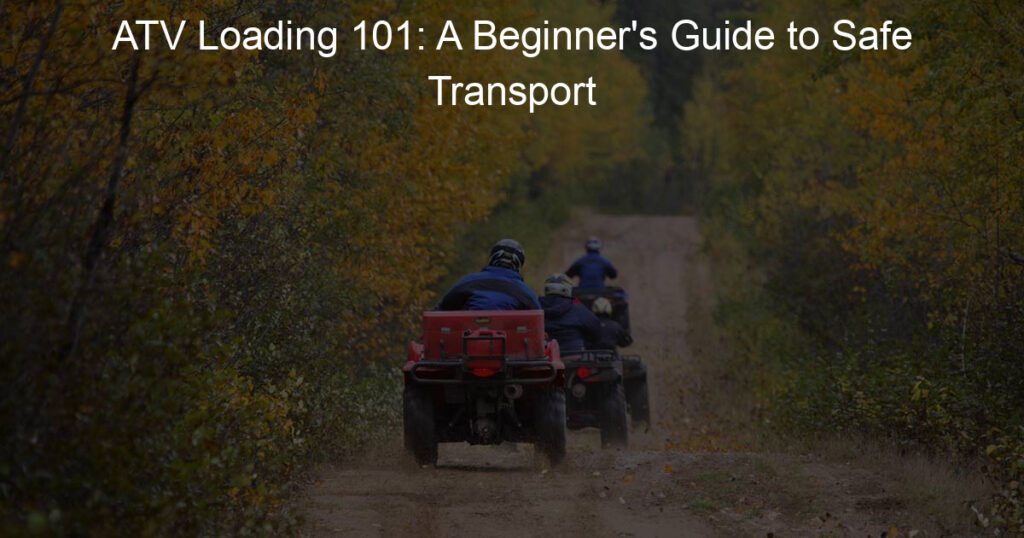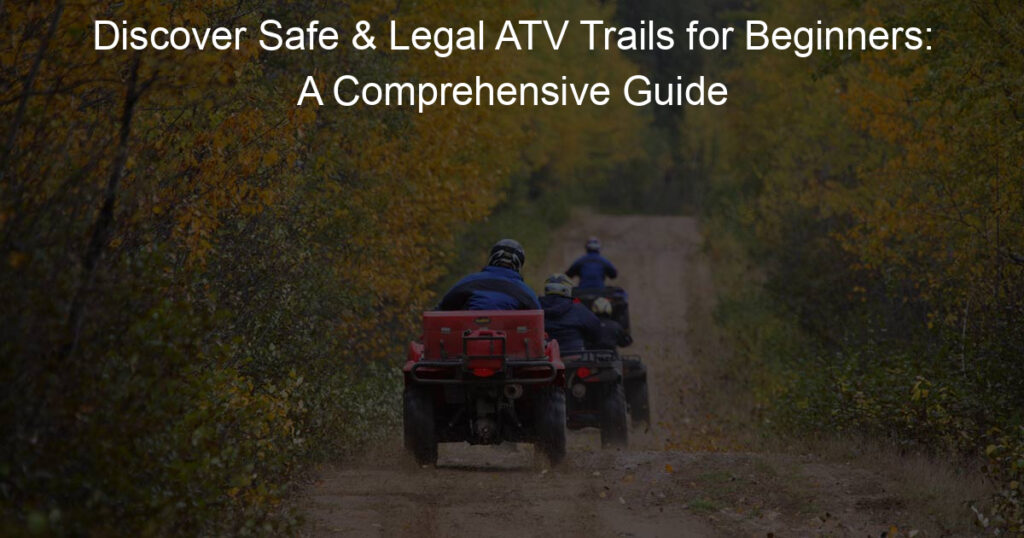The great outdoors has long been known for its positive effects on mental well-being. One way people engage with the outdoors is through the use of all-terrain vehicles (ATVs).
For some, hopping on an ATV is a thrilling and liberating experience, allowing them to escape the hustle and bustle of everyday life. No wonder these vehicles have been gaining popularity among outdoor enthusiasts, fitness buffs, and the mental well-being conscious.
With an increasing number of individuals indulging in the recreational use of ATVs, researchers have turned their attention to understanding the relationship between ATVs and mental well-being.
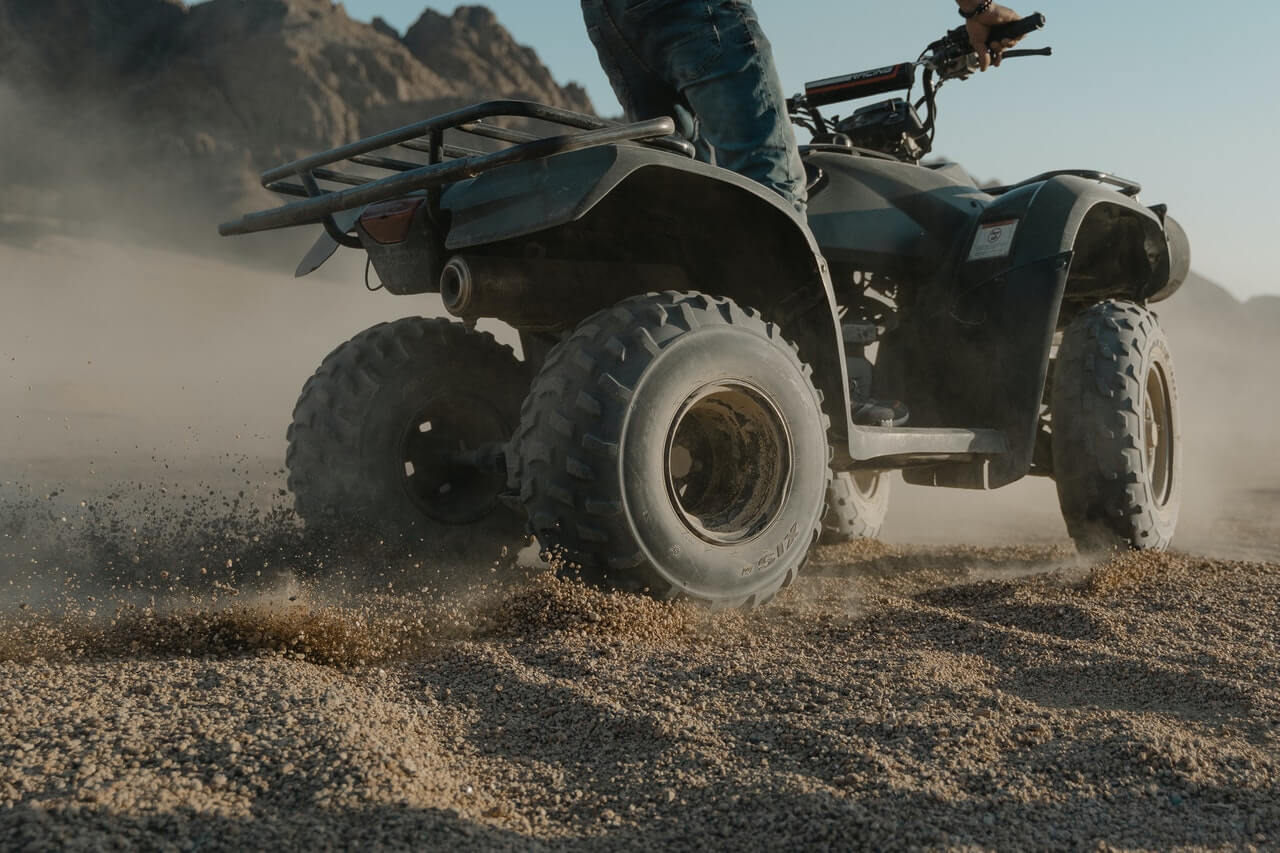
Some findings suggest that engaging in such activities can indeed be beneficial for mental health.
This article explores the connection between ATV riding and mental well-being, discussing various aspects, from physical activity benefits to its effects on psychological resilience and life satisfaction.
Key Takeaways
- ATVs are popular among outdoor enthusiasts and can help enhance mental well-being.
- Riding ATVs provides physical activity benefits and supports psychological resilience.
- ATV use can contribute to life satisfaction and serve as a form of leisure and coping during challenging times.
Understanding ATVs and Their Popularity
As an ATV enthusiast, I must say that there’s just something irresistible about the freedom and excitement that comes with riding an all-terrain vehicle (ATV). Many people enjoy ATVs for their high-octane thrills and the sense of adventure they offer.

The popularity of ATVs has continually grown, and they are now commonly used for both recreational activities and even athletic events.
The physical aspect of riding an ATV has some fitness benefits as well. It may not look like it, but operating an ATV actually engages many muscle groups.
For example, navigating uneven terrain requires the effort of core, arm, and leg muscles, which can help improve balance, coordination, and overall muscular strength.

Another reason for the popularity of ATVs is the connection to nature they provide. Riding outdoors through forests, across hills, or over sand dunes allows for fresh air and a break from the daily grind.
The sights, smells, and sounds of nature can have a positive effect on mental well-being. This kind of immersion can lower stress levels and contribute to a greater sense of relaxation.
Believe it or not, riding an ATV can boost confidence, especially for those participating in competitive events. When an athlete is able to conquer a challenging trail or cross the finish line, the resulting feeling of accomplishment can enhance their self-esteem and personal achievement.
In summary, ATVs offer an engaging and thrilling way to engage in physical activity, connect with nature, and boost mental well-being. The popularity of these vehicles has consistently grown, and as a rider myself, I can certainly understand the appeal.

Whether you’re an athlete looking for a new challenge or simply someone searching for a fun outdoor activity, I encourage you to consider giving ATV riding a try.
ATVs as a Form of Physical Activity
As someone who enjoys staying active, I find that riding ATVs is not only exciting but also a great form of physical activity. When we think about staying fit, training, and sports, we often focus on traditional exercises like running, lifting weights, or playing team sports like soccer or basketball.
Nevertheless, hopping on an ATV and traversing different terrains can be a fantastic way to engage our bodies and minds.

When you ride an ATV, you use various muscle groups throughout your body to maneuver, maintain balance, and control the vehicle. It can strengthen muscles such as your legs, arms, and core.
Whether I am riding on a sandy dune or trailing through muddy paths, my body is constantly adjusting to stay in control.
A significant aspect of physical well-being is cardiovascular health. ATV riding can raise your heart rate as you navigate the terrain, similar to other moderate to intense sports.

This change in heart rate can help improve cardiovascular endurance, so it’s great for maintaining heart health.
Another benefit to riding ATVs is that training and practice can improve your reflexes, balance, and coordination. When I ride, the changing terrain often requires quick thinking, shifting weight, and adjusting balance to keep the vehicle stable and responsive.
This continuous training is not only enjoyable but can also carry over to everyday activities that require coordination and a sense of balance.
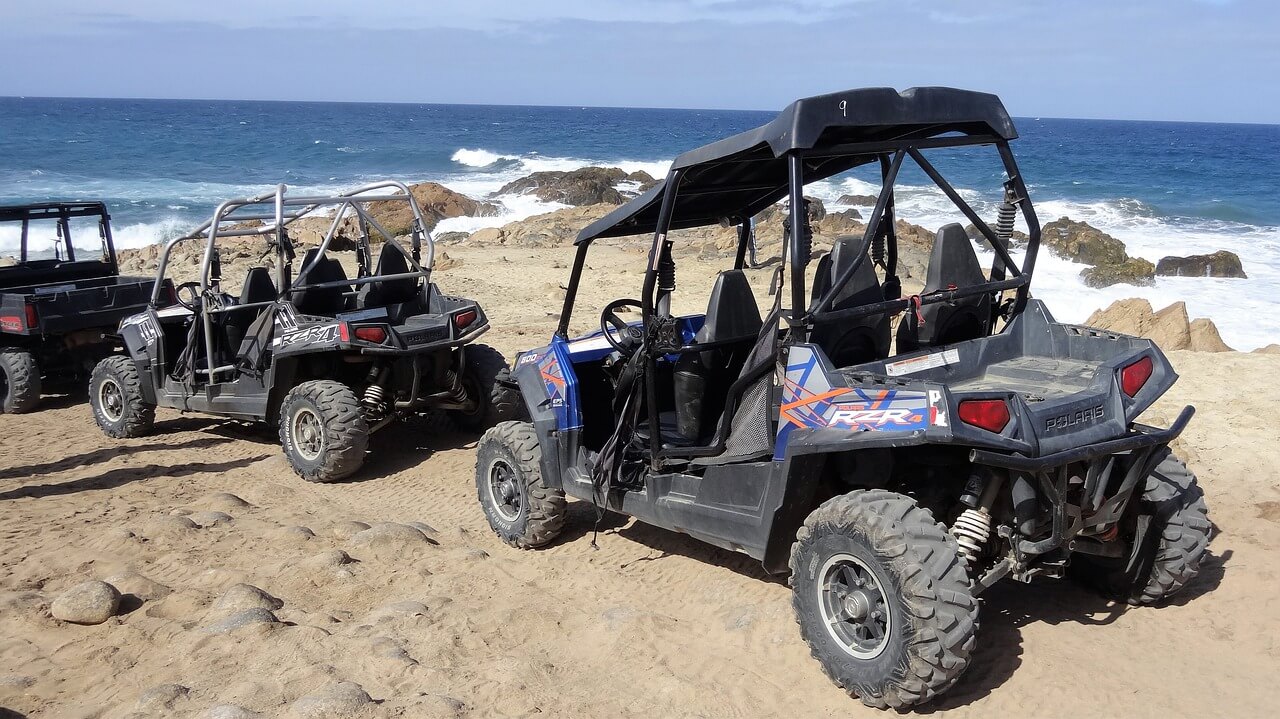
In summary, riding ATVs can be a fun and unique way to stay active, engage in physical activity, and practice new skills that can be valuable outside of ATV riding.
As always, remember to ride safely and responsibly so you can enjoy the long-term benefits of this engaging sport.
Age and ATV Use
I’ve found that age plays an important role in the relationship between ATVs and mental well-being. When it comes to adolescents they’re often attracted to the thrill and excitement that ATVs can offer.
This age group is known for seeking new experiences, and ATV riding can provide an adrenaline rush that they might not find in other activities.

In my research, I discovered that participating in ATV riding can actually boost the mental health of teenagers in several ways. For one, riding in the great outdoors can help reduce stress levels and enhance their mood.
Plus, as they ride, they’re likely to encounter challenges, like navigating rough terrain or mastering new skills, that can boost their self-confidence and feelings of accomplishment.
On the other hand, I also noticed that there can be risks associated with young riders using ATVs. Safety is a major concern, especially since adolescents may be prone to taking risks and not always making the wisest decisions.
Ensuring that they wear proper protective gear and adhere to safety guidelines is crucial to minimize potential hazards.
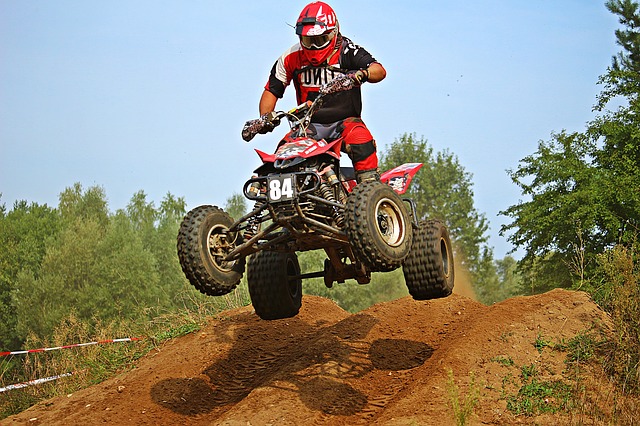
When it comes to older adults, the benefits of ATV riding can be different. For them, it may serve as a way to maintain an active lifestyle and engage in a hobby that keeps them both physically and mentally fit.
Riding can also offer social opportunities, as they might connect with like-minded individuals in their community or join ATV clubs.
Ultimately, age, and the experiences and challenges that come with it, should be taken into consideration when determining the relationship between ATVs and mental well-being.
By nurturing a safe and responsible passion for ATV riding, individuals across all ages can reap the mental health benefits of this thrilling outdoor activity.
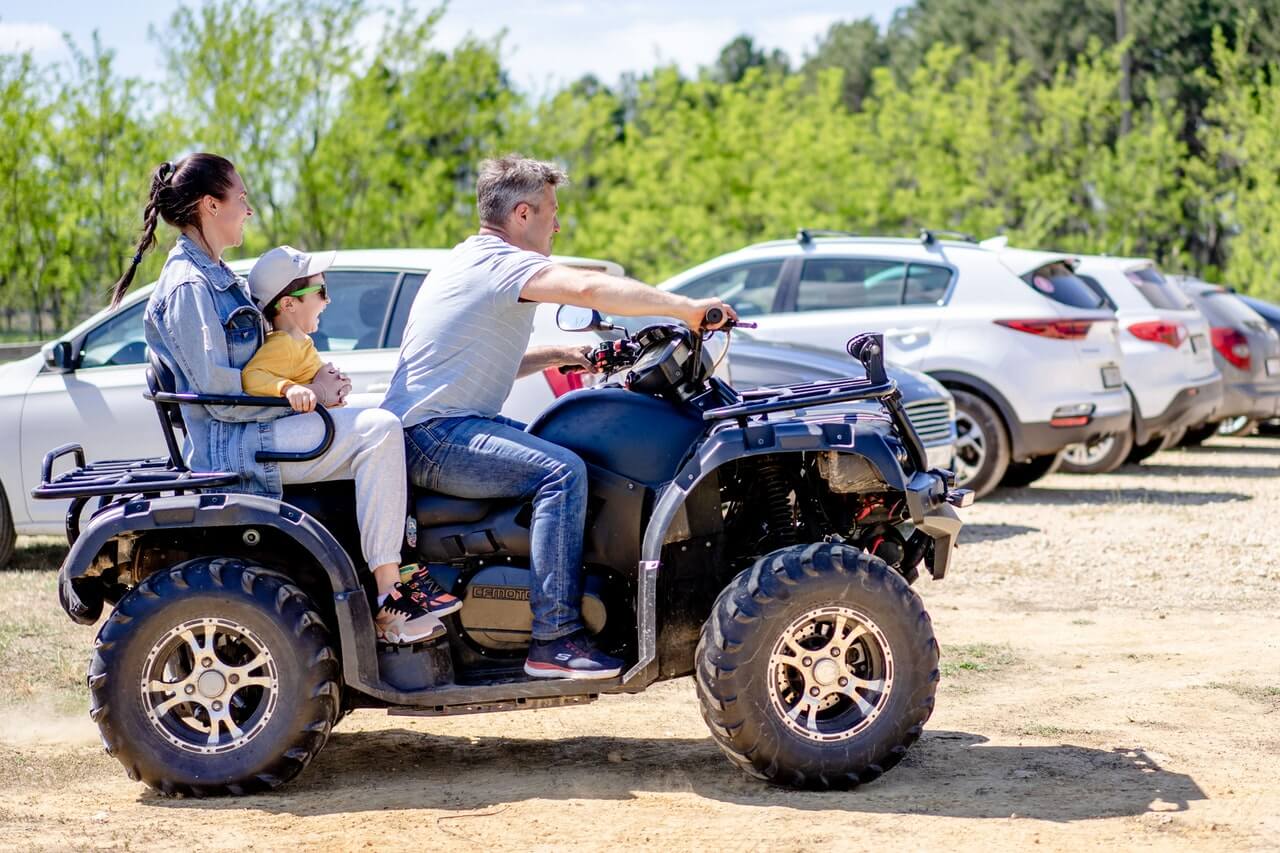
ATVs and Mental Health
Impact on Anxiety and Depression
As an ATV rider myself, I’ve noticed significant improvements in my mental well-being, particularly when it comes to anxiety and depression. For many individuals, riding ATVs provides a sense of freedom and adventure that can help alleviate depressive symptoms.
The excitement of exploring new trails and embracing the outdoors has a therapeutic effect on my mental health.
When I’m riding my ATV, it’s also easier for me to shift my focus away from the stressors and negative thoughts that can fuel anxiety and depression.
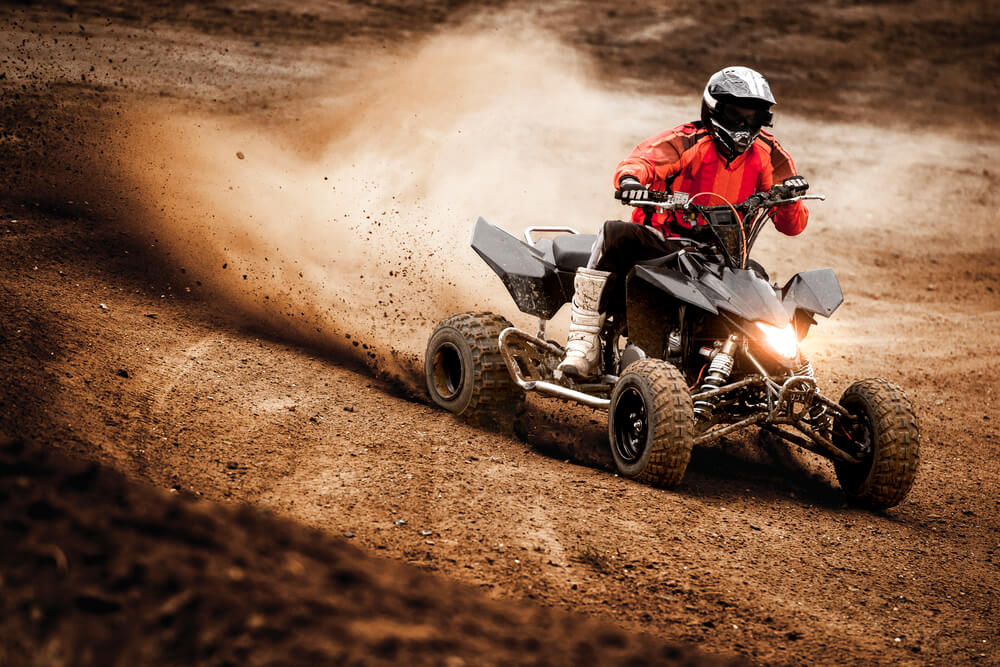
The physical activity of handling an ATV, combined with the mental engagement of navigating unfamiliar terrains, forces me to be present and fully engaged in the moment.
ATVs and Stress Management
For me, one of the greatest benefits of ATV riding is its ability to help with stress management. As a highly physical activity, riding my ATV allows me to channel my stress and pent-up energy into an enjoyable hobby.
- Adrenaline release: Hopping on an ATV triggers the release of adrenaline, which can help counteract the negative effects of stress. The boost of adrenaline I get from riding promotes a feeling of satisfaction and well-being.
- Outdoor exposure: Incorporating nature into my mental health routine through ATV riding has been incredibly beneficial. Studies have shown that exposure to the outdoors can reduce stress levels and enhance overall mental well-being.
- Social connections: Riding ATVs with friends and family offers a great opportunity to build and strengthen social bonds. Having a strong support system is important for mental health, and sharing this common interest allows me to interact with others as we enjoy the ride together.
In summary, my personal experience with ATV riding has helped improve my mental health by providing a much-needed outlet for stress and anxiety, fostering a connection to nature, and facilitating social interactions.
Physical Health Benefits from ATV Use
As an ATV enthusiast, I have experienced numerous physical health benefits from regularly using an all-terrain vehicle (ATV). It’s not only an exciting way to enjoy the great outdoors, but it also helps enhance our overall health.
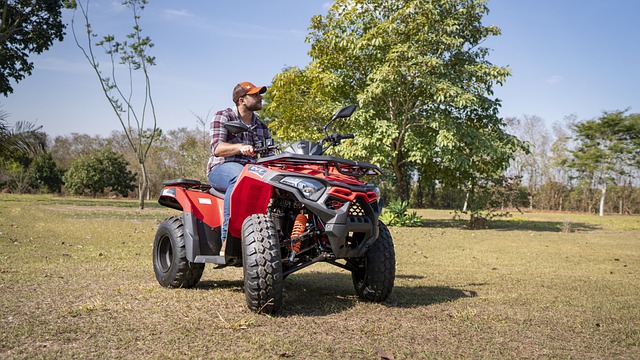
First and foremost, ATV riding is a fantastic cardiovascular workout. When I’m riding my ATV, my heart rate increases and my blood flow improves, helping to lower the risk of heart disease and stroke.
As I continuously maneuver my ATV through various terrains and challenging obstacles, my body is also working to maintain balance and coordination. This not only strengthens my core muscles but also enhances my flexibility and coordination.
Another significant aspect of ATV use is the improvement of strength and endurance in different muscle groups. During a ride, I often find myself engaging my arms, legs, and even my back muscles.
It’s like heading to the gym, but it feels much more fun! Regularly exercising these muscles helps reduce the likelihood of muscle-related injuries and can even prevent chronic conditions like diabetes.
While it’s essential to make sure I’m riding within my limits and taking proper safety measures, ATV use has certainly proven to have a positive impact on my physical health.
And while enjoying the great outdoors on an ATV, I’m not only having a great time but also investing in a healthier, happier me.
ATV Use and Psychological Resilience
As I started exploring the connection between ATV use and psychological resilience, I realized that engaging in this outdoor activity could bring about numerous mental health benefits. Riding ATVs requires quick adaptation to varied terrains, which can lead to improved adaptability skills in everyday life.
In essence, ATV riders develop a unique ability to effectively handle different situations thrown at them, ultimately boosting their psychological resilience.
Participating in ATV riding often exposes riders to challenging terrain and natural elements, which can help in the development of coping skills. Overcoming physical obstacles while riding inspires me to deal with emotional challenges in a healthier way.
As I gained confidence in maneuvering my ATV, I also noticed a positive shift in my self-efficacy – my belief in my ability to complete tasks and achieve my goals.
Moreover, when I ride with a group of fellow ATV enthusiasts, I feel a strong sense of camaraderie and social support. This sense of belonging contributes to an increased psychological resilience, enabling me to cope with life’s challenges more effectively.
While ATV riding may be an unconventional method for enhancing psychological resilience, it can undoubtedly foster essential personal growth.
By providing opportunities for adaptation, developing coping skills, and nurturing self-efficacy through an enjoyable and engaging activity, ATVs play a unique role in promoting mental well-being.
ATVs, Leisure Activities, and Life Satisfaction
I have noticed life satisfaction can be greatly influenced by leisure activities, and engaging in those that speak to our interests and passions can bring a boost to our subjective well-being. One such leisure activity that offers these benefits is ATV (All-Terrain Vehicle) riding.
As a rider myself, I find it refreshing to escape from the daily grind and venture into the great outdoors on my ATV. It not only provides a thrilling experience but also gives me a chance to connect with nature and clear my mind.
This combination of excitement and relaxation has been shown to positively impact life satisfaction.
Moreover, with the increase in sedentary lifestyles, ATV riding can offer a moderate form of physical activity that promotes a sense of flourishing in our lives. Riding ATVs through various terrains challenges our body and mind, enhancing our overall cognitive and physical abilities.
Furthermore, ATV riding can significantly contribute to our social life, as it is often enjoyed with friends and family. This shared experience kindles bonding among riders, which eventually enriches our interpersonal relationships, increasing our subjective well-being.
To sum up my experience, the incorporation of ATV riding into my leisure activities has provided me with a well-rounded and satisfying lifestyle. It facilitates an active way of living, strengthens relationships, and, ultimately, contributes to my general sense of fulfillment.
ATVs and Coping During the Pandemic
During the Covid-19 pandemic, I found that spending time with my ATV really helped me maintain my mental well-being. With social distancing guidelines in place, it became important to find activities that allowed us to keep our spirits up while staying safe.
I noticed the positive impact of riding my ATV on my mental health. As I rode through the trails, I was able to clear my mind and release some of the anxiety build-up from the ongoing pandemic.
There was an undeniable sense of freedom and control when navigating nature on an ATV.
What made ATV riding even better during these times was the fact that it inherently encouraged social distancing. The wide-open spaces and relative seclusion of off-road trails made it easy for me and fellow riders to stay a safe distance away from each other, all while enjoying the outdoors.
Riding an ATV also allowed me to feel a sense of accomplishment. Learning new techniques, challenging myself on different terrains, and becoming more confident as a rider gave me a feeling of progress during a time when things often felt stagnant.
Indeed, ATVs had proven to be a reliable and friendly escape from the sometimes overwhelming news cycle and neverending discussions about the pandemic. It reminded me of the importance of finding balance and taking breaks from stressors in an uncertain world.
Common Mental Health Disorders and ATV Use
ADHD and ATV Use
As someone who’s passionate about ATVs, I’ve noticed that there seems to be a connection between ADHD and ATV use. Attention Deficit Hyperactivity Disorder (ADHD) is a common mental health disorder that affects both children and adults.
It is characterized by hyperactivity, impulsiveness, and difficulties in paying attention.
I’ve found that many people with ADHD, including me, find ATVs to be a great way to release excess energy and improve focus. Riding an ATV can provide a much-needed outlet and an opportunity to practice mindfulness, which has a positive impact on mental well-being.
Plus, the thrill of speed and the focus required to navigate terrain can be incredibly rewarding.
Bipolar Disorder and ATV Use
When discussing the relationship between ATVs and mental well-being, we cannot overlook the potential impacts on individuals with bipolar disorder. This mental health disorder is characterized by episodes of extreme mood swings, ranging from emotional highs (mania) to devastating lows (depression).
At times, ATV riding has brought me solace during my depressive episodes, as the rush of adrenaline and the connection to nature can provide a much-needed mood boost. Regardless, it’s important to proceed with caution, as I’ve noticed the potential for mania to be exacerbated by the thrill of ATV riding.
While it is true that engaging in outdoor activities like ATV riding can have positive effects on emotional problems, it’s crucial for individuals with mental health disorders to monitor their symptoms and ensure that they maintain a balanced approach to these activities.
For me, ATV riding has been a helpful outlet during some difficult times, but I also recognize the importance of staying aware of my emotional state, seeking professional help when necessary, and maintaining a healthy balance in life.
Current Research and Studies on ATVs and Mental Well-being
One of the recent articles I came across discussed a fascinating cohort study conducted to assess the psychological impact of ATV riding on mental well-being. This study took a group of participants with varying levels of experience in ATV riding and tracked their mental health changes over time.
As I dug deeper, I found impressive peer-reviewed journal articles that delved into the potential influence of ATV riding on mental well-being. One of the authors, a well-respected psychologist, went to great lengths to shed some light on the possible reasons for this connection.
While looking further into these sources, I identified several recurring keywords: mental health, stress relief, adventure, and nature. It appears that these terms play a significant role in the overall findings of the studies.
As the research progressed, more authors started to focus on how ATV riding might affect one’s mental health. For example, they discovered that the combination of adventure and exposure to nature during ATV rides could potentially reduce stress and anxiety levels for riders.
Moreover, these studies recommended that additional research be conducted to confirm these conclusions and look into other areas of mental well-being. Here’s a brief overview of the topics they want to explore:
- The long-term effects of ATV riding on stress reduction
- The potential of ATV riding in alleviating symptoms of depression
- The influence of group riding dynamics on mental health
In short, I discovered a wealth of research indicating that riding an ATV could have a positive impact on one’s mental well-being.
Though further studies are suggested, the current literature is undoubtedly thought-provoking and opens the door to a new area of understanding how nature and adventure can benefit our minds.
Conclusion
As I have discussed throughout this article, ATVs have a significant impact on mental well-being. Engaging in outdoor activities like running and jogging can boost self-esteem, cognitive function, and overall positive mental health.
Riding ATVs has been shown to produce similar benefits by promoting a healthy mind and body connection.
According to a population survey, many individuals are struggling with mental health issues, and some may be languishing due to a lack of engaging activities.
ATV-related sports could potentially help these individuals by offering them a fun, adrenaline-filled way to exercise, improving not only their physical health but also their cognitive functioning.
In conclusion, incorporating a pastime like ATV riding into one’s life can contribute to a healthier and happier mental well-being. It is an exciting and exhilarating way to break free from mundane routines and experience nature, ultimately benefiting the mind and self-esteem.
So, if you have the opportunity, don’t hesitate to give ATV riding a try and experience these positive effects for yourself.
Frequently Asked Questions
How do ATVs contribute to stress relief?
When I ride an ATV, my focus shifts from daily stressors to the task of navigating the terrain. This allows me to clear my mind and forget about life’s troubles for a while.
As I become more immersed in the moment, my body releases endorphins, which are natural stress relievers.
Can riding ATVs improve mood and emotional well-being?
Yes, ATV riding can definitely lift my mood. The combination of adrenaline, physical activity, and being outdoors contribute to my emotional well-being.
Engaging in a fun and challenging activity like ATV riding can stimulate the release of dopamine, serotonin, and endorphins, which are known to boost happiness and overall mood.
What effects do outdoor activities like ATV riding have on mental health?
Being outdoors offers a myriad of mental health benefits by itself. When I engage in outdoor activities like ATV riding, I can enjoy nature, fresh air, and sunlight, which all contribute to a healthier state of mind.
Additionally, intertwining outdoor activities with fun and excitement provides a mental break from daily stressors and even helps reduce symptoms of anxiety and depression.
How does physical exercise from ATV riding impact mental wellness?
ATV riding is a physical activity that requires balance, coordination, and muscle strength. When I exercise through ATV riding, it not only improves my physical fitness but also positively impacts my mental health.
Physical exercise has been proven to alleviate symptoms of depression, anxiety, and stress, while also enhancing cognitive function and overall mood.
Do people who ride ATVs experience greater life satisfaction?
While I can’t speak for everyone, in my experience, riding ATVs has certainly enhanced my life satisfaction. Engaging in a hobby that combines excitement, outdoor adventure, and physical exercise provides me with a sense of accomplishment and joy.
Also, connecting with nature and like-minded individuals can boost social connections and overall well-being.
Are there therapeutic benefits of engaging in off-road ATV adventures?
Off-road ATV adventures can be therapeutic in several ways. For me, these adventures offer an opportunity to disconnect from daily stressors and connect with nature. The physical exercise and thrill that come with ATV riding can stimulate the production of neurotransmitters related to well-being, supporting a positive mental state.
While formal therapy may still be recommended for specific mental health concerns, engaging in off-road ATV riding can be a complementary practice for overall wellness.
